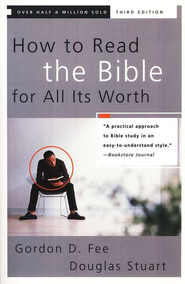Rightly Understanding God’s Word: Bible Background (Part 1 of 2), by Craig S. Keener
When Jesus goes on to say that breaking the least command makes one least in the kingdom whereas keeping it makes one great in the kingdom, a prosaic modern reader might ask, “What happens if you break one and keep another?” But such a question misses the point of this typically Jewish language. Later rabbis decided that the greatest commandment was honoring one’s father and mother, and the least, respecting a mother bird; they reasoned that both merited the same reward, eternal life (based on “life” in Ex. 20:12; Deut. 22:7). Thus if one broke the least commandment, one would be damned; if one kept it, one would be saved. Yet these same sages recognized that everyone sinned, including themselves. They were not saying that some people never broke any commandments; rather, they were saying that people could not pick and choose among the commandments. One could not say, “I am righteous because I do not kill, even though I have sex with someone I am not married to.” Nor could one say, “I am godly because I do not steal, even though I cheat.” All of God’s commandments are his word, and to cast off any is to deny his right to rule over us, hence to reject him. Thus Jesus was saying in a similarly graphic way, “You cannot disregard even the smallest commandment, or God will hold you accountable.”
PR
Next Issue: This study of Using Cultural Background continues with more examples and insights.
7. The Kingdom Prayer in Matthew 6:9-13
8. Enemy Soldiers Torture and Mock Jesus in Matthew 27:27-34
9. Adultery and Murder in Mark 6:17-29
10. A New King’s Birthday in Luke 2:1-14
11. Demands of Discipleship in Luke 9:58-62
12. God’s Friends Rejoice in Luke 15:18-32
13. The First Gentile Christian in Acts 8:26-27
14. Paul preaches to Philosophers in Acts 17:22-31
15. Paul Adapts Ancient Family Rules in Ephesians 5:21-6:9
16. Jesus Rebukes the Self-Sufficient in Revelation 3:15-18
Editor’s Note
Professor Craig S. Keener originally designed this course on Hermeneutics for use in Nigeria and not for traditional publication. Desiring to make it available to a wider audience, he has granted permission to publish this course in the Pneuma Review. Dr. Keener grants permission for others to make use of this material as long as it is offered without cost or obligation and that users acknowledge the source.
Portions of this course follow these recommended works: How to Read the Bible for All Its Worth by Gordon Fee and Douglas Stuart (Zondervan). Revelation, NIV Application Commentary by Craig S. Keener (Zondervan, 1999).
Category: Biblical Studies, Fall 2004, Pneuma Review



